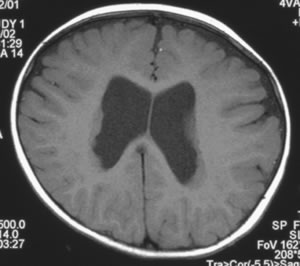Conditions affecting neurodevelopment are common and can have a genetic basis. They range from developmental delays to intellectual disability and abnormalities of the structure of the brain.
One of the surprises of our work implicating mutations in the filamin A gene (FLNA) in the causation of the otopalatodigital syndrome spectrum disorders was the fact that five years previously this same gene had been implicated in an entirely different clinical condition—periventricular neuronal heterotopia (PH) – a disorder of brain development.
This condition is clinically characterised by epilepsy, and is caused by the failure of neurons to migrate to their correct configuration within the brain during embryonic and fetal development. We conduct genetic and functional analysis of samples from patients with this condition on a research basis. We are currently conducting a large genome sequencing-based project, aimed at identifying the underlying genetic causes of this form of neuronal disorder. Extending from this study we are also using cellular models of these conditions to model how brain cells mature during development.

CT scan image of the brain of a patient with periventricular neuronal heterotopia
In a previous study we characterised the causes of a discrete but new form of PH called Van Maldergem syndrome. The two genes mutated in this autosomal recessive condition (DCHS1 and FAT4) conduct a signalling circuit within the developing brain to regulate neuroprogenitor cell proliferation and maturation. Understanding the causes of conditions like this will extend our understanding of how neuronal stem cells regulate themselves during development.
More recent work has involved collaborating with international teams to chart the genetic basis of a broad range of PH phenotypes and also implicating genomic elements that are primate-specific in the causation of the disorders. Current collaborators include:
Funded by Cure Kids, HRC, the Marsden Fund and Genomics Aotearoa
